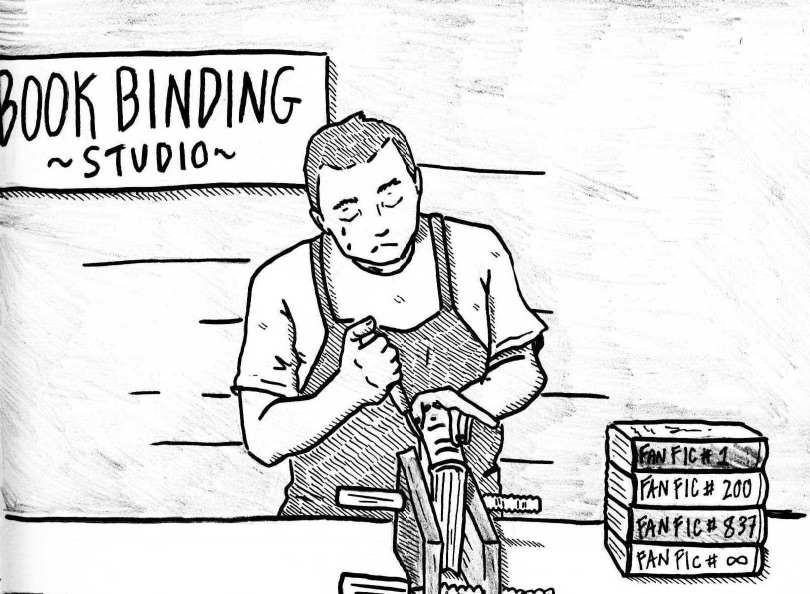Fanfiction is a topic The Pitt News Opinions Desk has covered a multitude of times. We’ve discussed how fanfiction works as an “extension” of preexisting stories as well as the ins and outs of erotic fanfiction — an incredibly popular form of the genre. We’ve even touched on the aptitude of such work and how it needs to be viewed as just as deserving of validation and quality as any other art form.
As a casual connoisseur of Marvel and “Supernatural” fanfiction for almost a decade, I am inclined to be very pro-fanfiction myself as well. I must admit that some of the best literary works I have ever read included Bucky Barnes or Dean Winchester taking me on lavish dates and saving the world. Because of course. It’s fanfiction!
For decades, fanfiction has fought for its right to be a distinguished and legitimate form of media. Countless authors contribute to various platforms every day with original stories using the characters and worlds of pre-established narratives. For some it is a hobby. For others it is a way to work your writing chops before entering the big, bad publishing world. Many authors who are traditionally published, many of whom top the New York Times Best Sellers list, got their start writing fanfiction for the masses. The infamous “Fifty Shades of Grey” series was originally “Twilight” fanfiction, Ali Hazelwood’s debut novel “The Love Hypothesis” was originally fanfiction about Rey and Kylo Ren from the “Star Wars” universe and the infamous “After” movies were initially Wattpad stories written about Harry Styles. Dante’s “Divine Comedy” — yes, the one from the 14th century — is widely regarded to be self-insert fanfiction about the Bible. Nobody would deny the “Divine Comedy” its legitimacy as a “y/n” fanfic — its impact has affected organized religion tenfold. And while not every fanfiction writer becomes a published author, nor do they all garner the same impact Dante was able to achieve, fic authors are authors in their own right, even if they do not own the characters and intellectual property they are operating under.
Fanfiction operates in this murky gray area of copyright law. Is it legal? Yes. But it very easily can not be.
When determining the legality of fanfiction, and whether or not the intellectual property owner has standing to sue, there are various factors at play. If the material utilized by a fic writer falls under public domain or if the written story falls under one of the Fair Use provisions, the author is usually in the clear. Similarly, if the owner of the IP has explicitly granted approval for derivative fanfiction, subsequent fics are typically considered legal as well. However, without these definitive guidelines, many writers skirt the line between legal and illegal, potentially violating copyright law.
Copyright law is a legal tool used to protect the interests of artists, authors and other IP owners, giving them nearly full control of their intellectual and creative property. According to Bytescare, a digital security company, copyright law enables owners to “control the use, distribution, and reproduction of their creations, ensuring they receive recognition and financial compensation for their intellectual property.” Therefore, copyright law serves not only as a mechanism to incentivize creators by providing them sole or exclusive rights to their work, but it also establishes a framework for resolving disputes through legal means, thereby safeguarding the integrity and value of intellectual property.
While many, including myself, believe fanfiction to be a legitimate form of creativity and literature, at its core, fanfiction violates the principles of ownership and uses the IP of many creators. However, fortunately for us consumers, most fanfiction operates under the Fair Use Doctrine as long as it proves to be “transformative.” Meaning, according to the Organization of Transformative Works, which runs the popular fanfiction site AO3, that fic authors “added new content with new meaning and value to the work.” Typically, these standards protect material if its purpose is for criticism, comedy or parody.
Arguably the most important factor that keeps our beloved fanfiction legal though is that fic authors do not generate capital from their fanfiction — it is noncommercial. This means that the fic authors cannot make any money from their work while operating legally under copyright law. It is one or the other. For the most part, if a fic author monetizes their stories, it immediately becomes illegal and violates copyright law.
For the last few weeks, there has been a rising trend on TikTok where individuals are downloading, formatting and binding copies of their favorite fanfics to own or to gift. Most people would agree that owning and reading a physical book is significantly preferred over a digital copy, especially when the alternative is reading on a phone or laptop. The trend was widely loved and replicated across the platform, with authors of the fanfic particularly taking an interest to see their books in personal form. Many creators devoted their channels to teaching others to book bind as well as demonstrating how to properly format the fanfiction so that it is standard book size.
Unfortunately, because every last enjoyable thing must be monetized in a capitalist society, certain small businesses have taken advantage of the trend and have used their skills to threaten the entire fanfiction community.
On Etsy and throughout the internet, those with the intricate skills of bookbinding have decided to bind and sell popular fanfics to devoted fans. The Harry Potter fandom has been hit particularly hard, with popular Dramione (Draco + Hermione) fanfics like “Manacled” and “Breath Mints/Battle Scars” getting bound and sold repeatedly.
If you can’t see where I am already going with this after my incredibly long winded introduction about copyright law, I will spell it out for you — this is highly illegal.
The sale of fanfiction is a direct violation of copyright law, instantly transforming these previously noncommercial creations into commercial products to turn a profit. However, it is incredibly important to note that the individuals profiting from these bound forms of fanfiction are often small businesses and artists whose intent is to make a quick buck from fan communities. It is not the original writers themselves. As a result, many fic authors have found themselves with the need to remove their beloved works from the internet, hoping to avoid the risk of legal repercussions arising from the actions of these book binders.
Both “Manacled” and “Breath Mints/Battle Scars” have been removed from their home sites and many fans are predicting more of their favorite writers will remove their stories as well. J.K. Rowling is notoriously litigious, and if the bound books reach Disney-owned fandoms it will become a significantly more dire situation, not only for the artists creating these bound books, but for the initial writers who are not involved in the monetization of their work.
If artists looking to profit through the binding of fanfiction continue to sell and promote the sale of these stories, fanfiction as we know it could be irreparably altered by the legal system. Fanfiction is already tiptoeing on the line, but this could be the catalyst that pushes it over into illegal territory. Such actions risk not only altering the nature of fanfiction, but also jeopardizing the delicate balance between creative expression and copyright law, potentially undermining the longstanding tradition of fan engagement, such as the creation of fanfiction, to operate legally. Who will take the risk of composing and sharing fanfiction if the very real threat of litigation is around the corner? Before, fic writers could operate peacefully, but the artists of the creation and sale of their fanfiction in physical form present a real threat.
Clearly, fanfiction has altered our media landscape for centuries and has effectively operated in the modern legal system until today. Many authors get their start in fanfiction due to the often welcoming fan communities and ease of creation — there is no need to worldbuild or character-build. While being a fic author isn’t a prerequisite to becoming a traditionally published novelist, it is certainly a popular stepping stone many take on their way to career success.
If fanfiction ceases to exist, who is to say what will happen not only to aspiring authors but to the Fair Use doctrine in general. As much as I would love to take money from Disney and transphobic J.K. Rowling, if copyright law is going to protect the little guys, it has to protect the real ones as well. And therefore, they are entitled to sue when their IP is infringed upon — as it clearly is with the bound copies of fanfiction.
Devoted fans have taken to Etsy to report these listings. Many are even taking to the internet to inform young fans to report and not purchase such copies as well. Those with operating brain cells can recognize the illegality of the monetization of bound fanfiction and are working to protect not only their favorite fanfics, but also their authors and the rest of the fan community. Hopefully their efforts are effective, or else fanfiction as we know it may change forever.
Livia LaMarca is the assistant editor of the opinions desk who misses using the Oxford comma. She mostly writes about American political discourse, US pop culture and social movements. Write to her at [email protected] to share your own opinions!




